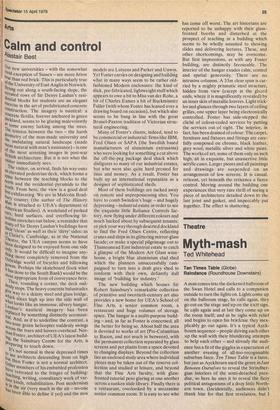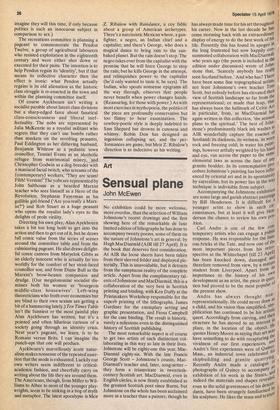Theatre
Myth-mash
Ted Whitehead
Ten Times Table (Globe) Ralndance (Roundhouse Downstairs) A man comes into the darkened ballroom of the Swan Hotel and calls to a companion outside to turn the lights on. Lights come up on the ballroom stage, he calls again, they go out on the stage and up on the EXIT sign, he calls again and at last they come up on the room itself; and as he sighs with relief and begins to open his briefcase they inexplicably go out again. It's a typical Ayckbourn sequence — people driving each other up the wall with their blundering attempts to help each other — and already the audience has a fit of the giggles in expectation of another evening of all-too-recognisable suburban farce. Ten Times Table is a farce, but just as Ayckbourn used the genre inJust Between Ourselves to reveal the Strindbergian interiors of the semi-detached paradise, so here he uses it to reveal the fiery political antagonisms of a dozy little Northern town. (Incidentally, audiences didn't thank him for that first revelation, but I
imagine they will this time, if only because politics is such an innocuous subject in comparison to sex.) The recreations committee is planning a pageant to commemorate the Pendon Twelve, a group of agricultural labourers who resisted exploitation in the eighteenth century and were either shot down or executed for their pains. The intention is to help Pendon regain its 'identity', but if that means its collective character then the effect is ironic: what Pendon actually regains is its old alienation as the historic class struggle is re-enacted in the town and within the planning committee itself.
Of course Ayckbourn isn't writing a socialist parable about latent class divisions
but a sharp-edged farce about fanatical class-consciousness and liberal ineffectuality. The nobs are represented by Julia McKenzie as a royalist militant who regrets that they can't use bombs rather than muskets on the revolting peasants, Paul Eddington as her dithering husband, Benjamin Whitrow as a pedantic town councillor, Tenniel Evans as an alcoholic refugee from matrimonial misery, and Christopher Godwin as a dog-breeder with a maniacal facial twitch, who screams of the (contemporary) workers, 'They are scum! Filth! Vermin!' The yobs are represented by John Salthouse as a bearded Marxist teacher who sees himself as a Hero of the Revolution, Stephanie Fayerman as his gullible girl-friend ('Are you really a Marxist?') and Rob Stuart as a huge peasant who opens the royalist lady's eyes to the delights of prole virility.
Directing his own play, Alan Ayckbourn takes a bit too long both to get into the action and then to get out of it, but he draws full comic value from the series of scenes around the committee table and from the culminating pageant. He also draws delightful comic cameos from Matyelok Gibbs as an elderly innocent who is actually far too worldly for the comfort of her strait-laced councillor son, and from Diane Bull as the Marxist's brow-beaten companion and drudge. (Our megalomaniac socialist dismisses both his women as 'bourgeois middle-class housewives'. Left-wing theoreticians who froth over economics but are blind to their own sexism are getting a bit of a hammering lately.) Ten Times Table isn't the funniest or the most painful play Alan Ayckbourn has written, but it's a pointed and often hilarious cartoon of a society going through an identity crisis. Next year's pageant, we learn, is to be Romans versus Brits. I can imagine the punch-ups that one will produce.
Ayckbourn's marvellously acute naturalism makes nonsense of the repeated assertion that the mode is exhausted. Luckily our own writers seem indifferent to criticalacademic fashion, and cheerfully carry on writing about the life they see around them. The Americans, though, from Miller to Williams to Albee to most of the younger playwrights, seem to be sinking in a bog of myth and metaphor. The latest apocalypse is Meir
,Z. Ribalow with Raindance, a coy fable about a group of American archetypes. There's a narcissistic Mexican whore, a gunfighter, a negro, an Indian chief and a capitalist; and there's George, who does a magical dance to bring rain to the sunbaked planet. But the rain doesn't stop. The negro takes over from the capitalist with the promise that he will force George to stop the rain; but he kills George in the attempt, and relinquishes power to the capitalist (he'd only wanted to taste it, he says). The Indian, who spouts nonsense epigrams all the way through, observes that people never benefit when power changes hands. (Reassuring, for those with power.) As with most exercises in mythopoeia, the politics of the piece are profoundly conservative but too flimsy to bear examination. The cowboy-poetic style is deeply indebted to Sam Shepard but drowns in cuteness and whimsy. Robin Don has designed an ingenious collapsing set, and the performances are game, but Meir Z. Ribalow's direction is as indecisive as his writing.



































 Previous page
Previous page